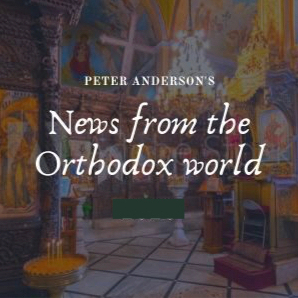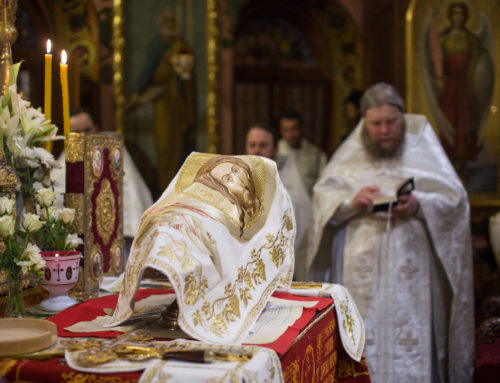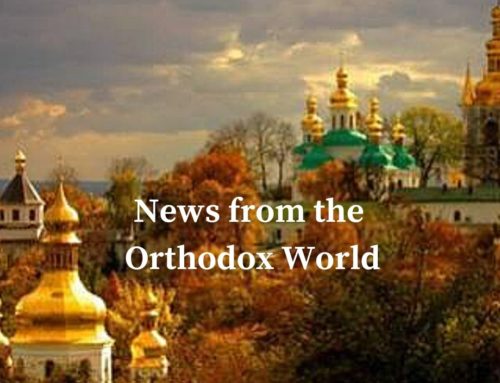Peter Anderson reports from the Orthodox world.
Longstanding reporter of the news from the Eastern Church, Peter Anderson shares our dream of a unified Christianity. His love for Orthodoxy has driven him to this personal mission to share the news of East with the world through his email list. The Urbi et Orbi Foundation is proud to share his efforts and his insights with you.

On January 23, Montenegro President Milo Đukanović signed the “Re-decision on the Law on Amendments to the Law on Freedom of Religion or Belief and the Legal Status of Religious Communities.” https://www.b92.net/eng/news/region.php?yyyy=2021&mm=01&dd=25&nav_id=110259 As you recall, Đukanović had returned the law to Parliament on January 2, but then Parliament had reenacted the law a second time on January 20 by a vote of 41 of the 81 deputies. Đukanović stated that after the reenactment, he had no choice under the Constitution but to sign the law. On January 26, the signed law was published in the Official Gazette of Montenegro and legally went into effect. The text of the new law can be read on the website of the Official Gazette at https://www.sluzbenilist.me/pregled-dokumenta/?id={80A433F1-D986-4ED0-A689-6A0DD388B105}. Many had assumed, including myself, that the long fight over the controversial law was now over.
However, Đukanović had stated when he signed the law that the problems with the law still remained. He remarked that after the legislation became law following its publication, the issue of the constitutionality of the law could be raised before the Constitutional Court of Montenegro by any entity in society. https://www.telegraf.rs/english/3293388-this-time-djukanovic-signs-new-laws-adopted-by-assembly-including-that-on-freedom-of-religion. He did not have long to wait. On January 26, the same day as the publication of law in the Official Gazette, the NGO Montenegro International filed a petition with the Constitutional Court challenging the constitutionality of the new law and requesting an order from the Court suspending the law until the final decision of the Court. https://montenegrointernational.org/mi-podnijela-inicijativa-za-ocjenu-ustavnosti-zakona-o-izmjenama-i-dopunama-zakona-o-slobodi-vjeroispovjesti/ The NGO makes the claim that the enacted amendments to the law would legalize the principle of discrimination between religious communities and alienate state properties and cultural treasures of Montenegro to a religious community that has no legal personality in Montenegro but which is a religious community of another state.
The Week of Prayer for Christian Unity ended on January 25, the feast of the conversion of St. Paul. In Rome, the traditional vesper service was held at the Basilica of St. Paul Outside the Walls, but without the participation of Pope Francis, who was suffering from sciatica. In the Pope’s absence, Cardinal Kurt Koch presided. https://www.christianunity.va/content/unitacristiani/en/news/2021/2021-01-26-vespers-st-paul-outside-the-walls.html A video with English commentary of the entire service can be viewed at https://www.youtube.com/watch?v=XSjTcowPico&feature=emb_logo. The full text of the English translation of the Pope’s address, read by Cardinal Koch, is available at https://www.vatican.va/content/francesco/en/homilies/2021/documents/papa-francesco_20210125_vespri-unitacristiani.html.
Cardinal Koch processed into the Basilica with Bishop Atanasie of Bogdania (Episcopal Vicar of the Romanian Patriarchate’s Diocese of Italy) and Archbishop Ian Ernest (Archbishop of Canterbury’s representative to the Holy See). Both of these bishops led prayers in the service and joined Cardinal Koch in blessing those present at the end of the service. Representatives of other Christian denominations were seated in a semicircle with the three in the choir of the Basilica. These included Father Alexei Maksimov (a priest at the Moscow Patriarchate’s St. Catherine Church in Rome) and Archimandrite Simeon Catsinas (rector of the Ecumenical Patriarchate’s San Teodoro in Palatino Church in Rome). During the program, the Our Father was recited together in Latin.
In Moscow, the traditional prayer for Christian unity was held in the Catholic Cathedral of the Immaculate Conception. https://cathmos.ru/v-moskve-proshla-ezhegodnaya-molitva-o-edinstve-hristian/; https://www.blagovest-info.ru/index.php?ss=2&s=3&id=92688 Aside from Catholic Archbishop Pavel Pezzi and the apostolic nuncio Archbishop Giovanni d’Aniello, there were also representatives of the Armenian Apostolic, Anglican, Lutheran, Assyrian, Baptist, and Seventh Day Adventist Churches present. Representatives of the Moscow government were also there. For the first time in many years, the Moscow Patriarchate did not send a representative to the service this year. In recent years, Father Alexei Dikarev of the DECR was the Orthodox representative and took an active part in the service. I have seen no explanation for the absence of the representative of the Moscow Patriarchate this year.
In St. Petersburg, a prayer service for Christian unity was held on January 24 at the Catholic church of St. Stanislav. https://cathmos.ru/molitvy-o-edinstve-hristian-v-sankt-peterburge/ A short video of the service can be viewed at https://www.youtube.com/watch?v=6kiXkmVb-lQ&feature=emb_logo. The service was led by the new Catholic auxiliary bishop Nikolai Dubinin, who has special responsibility for the northern and western (Kaliningrad region) deaneries of the Archdiocese and who now resides in St. Petersburg. There was an Orthodox representative at this service – Archpriest Dimitri Sizonenko from the Feodorovsky Cathedral. The Feodorovsky Cathedral is one of the most dynamic parishes in St. Petersburg. The parish even has a separate website in English! https://en.feosobor.ru/ Its priests have been open to good relations with the Catholic Church. Father Dimitry himself was previously in charge of inter-Christian relations at the DECR in Moscow, and later in Brussels he was the representative of the Moscow Patriarchate to European international organizations. Another priest who serves at the Feodorovsky Cathedral is Archpriest Vladimir Khoulap. Father Vladimir is vice-rector of the St. Petersburg Orthodox Theological Academy and a member of the Synodal Theological Commission and the Inter-council Presence of the Moscow Patriarchate. He is also a member of the Saint Irenaeus Joint Orthodox–Catholic Working Group. The rector of the Cathedral is Archpriest Alexander Sorokin. Father Alexander heads the publishing department of the Metropolia and its magazine Living Water. In December 2013, Father Alexander hosted Cardinal Kurt Koch at the Cathedral. In the video of the January 24 service, one can also see Orthodox Archpriest Vladimir Fedorov in the first pew. Earlier in his life, he was closely associated with the WCC and has long been one of the strongest Orthodox advocates of ecumenism in St. Petersburg.
Metropolitan Hilarion (Moscow Patriarchate) has given a significant interview to the popular Greek website Romfea.gr. https://www.romfea.gr/epikairotita-xronika/41766-bolokolamsk-ilarionas-den-eprepe-na-pistepsoume-ton-patriarxi-bartholomaio-mas-ejapatise (Greek); https://mospat.ru/ru/2021/01/26/news190576/ (Russian); https://orthodoxie.com/interview-du-metropolite-hilarion-de-volokolamsk-au-portail-internet-grec-romfea/ (French) One of the topics covered was Ukraine. The following (Google translation) is an excerpt from the Metropolitan’s response on this topic:
The topic of autocephaly was discussed many times during the pre-conciliar process, namely during the meetings of the Inter-Orthodox Preparatory Commission in 1993, 2009, and 2011. The text of the document “Autocephaly and the method of its proclamation” was almost completely agreed upon. All Churches, represented by their representatives, agreed that the granting of autocephaly in the future will be possible only with the approval of all Local Churches, and not by the sole decision of the Ecumenical Patriarch. It only remained to agree on the form in which the signatures under the tomos of autocephaly would be – an agreement on this topic could not be reached. And what happened then? In April 2011, Patriarch Bartholomew sent letters to the Local Orthodox Churches with a proposal to remove the topic of autocephaly from the agenda and hold a Pan-Orthodox Council.
As you know, in 2016 at the Synaxis of the Primates in Chambesy, Patriarch Bartholomew publicly, in front of all the delegations of the Local Churches, said: “We recognize Metropolitan Onufry and welcome him as the only canonical hierarch of our Orthodox Church in Ukraine, together with the holy bishops subordinate to him.” … Patriarch Bartholomew also promised not to interfere in church affairs in Ukraine either before the Council or after it. We believed these words. We thought: since the Ecumenical Patriarch says so, let us really, as he promises us, hold a Council, and after that we will continue to discuss the topic of autocephaly. We couldn’t believe him, he deceived us. This was our big mistake.
As for the non-participation of the Russian Orthodox Church in the Cretan Cathedral, you know very well how events developed. The document “Regulations for the organization and work of the Holy and Great Council,” approved by the Local Orthodox Churches, presupposes the convening of a Council with the consent of the Primates of all autocephalous Churches¹. That is, the Council should be held with the participation of all universally recognized Local Orthodox Churches.
When three Local Churches – Bulgarian, Georgian and Antioch – refused to participate in the Council, Patriarch Kirill wrote a letter to Patriarch Bartholomew with a proposal to hold an urgent Pre-Council meeting, resolve the existing issues and still invite these Churches to the Council. But I received an answer from Patriarch Bartholomew: “The new extraordinary pan-Orthodox pre-council meeting proposed by your Holy Church was considered impossible, since there is no legal basis for its convocation.” Who considered it impossible? There were still two weeks before the Cathedral. Why was it impossible to take measures so that all the same took part in the Council?
The legitimacy and bindingness of the decisions of the Pan-Orthodox Council depended on the participation of the fullness of Orthodoxy in it. Therefore, if the delegation of the Russian Orthodox Church took part in the Council of Crete, it would be forced to declare that the Council has no legitimacy, because it lacks three Churches. This means that the Council would have frustrated.
Now we are told that if you went to the Cretan Council, then there would be an agreement on Ukraine, and nothing of the subsequent events would have happened. I heard this from many Greek bishops with whom I met. But if you remember that the topic of Ukraine was by no means on the agenda of the council, it turns out that the only motive for Patriarch Bartholomew’s actions is revenge. That is, out of a sense of revenge, he decided to grant “autocephaly” to the schismatics, to “legalize” the anathematized Filaret Denisenko?
As can be seen, Metropolitan Hilarion states the “only motive” for Bartholomew’s action in Ukraine must be “revenge.” However, there is a question mark at the end of the last sentence quoted above. On the other hand, Patriarch Kirill in his Christmas interview indicated that Bartholomew’s actions in Ukraine were the result of “pressure from powerful political forces emanating from one of the world superpowers.” https://mospat.ru/en/2021/01/07/news189972/ Russian Foreign Minister Sergey Lavrov has stated that “American colleagues … made Ecumenical Patriarch Bartholomew follow the path of schism….” https://www.mid.ru/en/foreign_policy/news/-/asset_publisher/cKNonkJE02Bw/content/id/4527635 .
In the Catholic cathedral in Minsk on January 24, there was a “farewell” Mass for retired Archbishop Kondrusiewicz and for the assumption of responsibilities by the new apostolic administrator Bishop Kazimierz Wielikosielc. https://cruxnow.com/church-in-europe/2021/01/at-mass-minsk-archbishop-hands-over-archdiocese-to-administrator/ An excellent article by the leading Belarus website, tut.by, includes a description of the emotional event with photos and videos. https://news.tut.by/society/716150.html It is very apparent that although the Archbishop has retired, he will still be playing a very active role in the life of the Catholic Church in Belarus. On January 22, both Archbishop Kondrusiewicz and Metropolitan Veniamin, the head of the Belarusian Orthodox Church, appeared at the Christmas program of the Saints Methodius and Cyril Christian Education Center. https://church.by/news/mitropolit-veniamin-vozglavil-provedenie-rozhdestvenskogo-vechera-hristianskogo-obrazovatelnogo-centra The Center is a project of the Belarusian Orthodox Church. https://christeducenter.by/sentre/ The Christmas program was held in the Great Hall of the Belarusian State Philharmonic. The following is a video of this major Orthodox event: https://www.youtube.com/watch?v=PwDyuUCRZtw&feature=emb_logo The address (8 minutes long) by Archbishop Kondrusiewicz begins at 19:20. I was impressed by the long applause received by Archbishop Kondrusiewicz at the beginning and the end of his address from this large Orthodox audience.
Peter Anderson, Seattle USA


